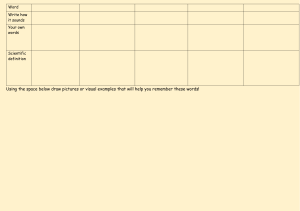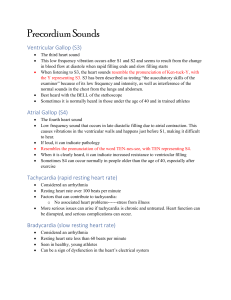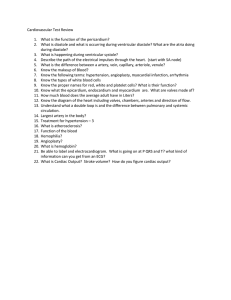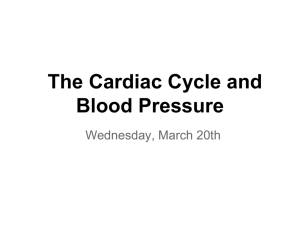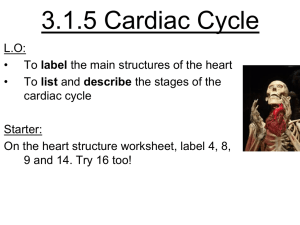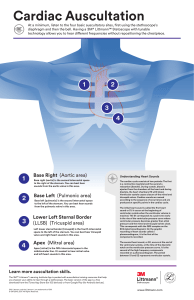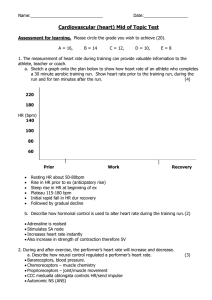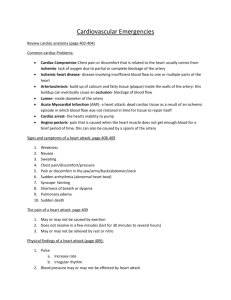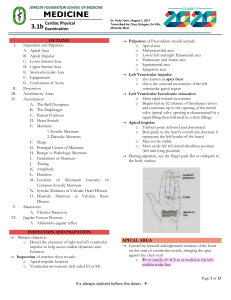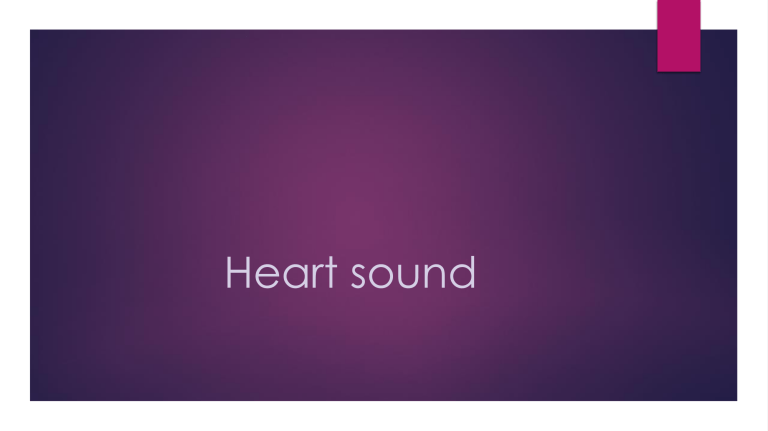
Heart sound Introduction : A total of four (4) heart sounds :Are produced by : The certain mechanical activities . During each cardiac cycle . The study of heart sounds :Is important For the diagnostic value in the many heart diseases Methods of study of Heart sounds : 1-Auscultation with the stethoscope . The First and Second heart sound can be heard with the help of stethoscope. 2-Phonocardiogram: Graphical record of all four heart sounds achieved by placing an electronic sound transducer over the chest and connecting it to a recording device like polygraph. Heart Sounds : Cause: Produced by the vibration set up by the sudden closure of AV (Atrio-Ventricular) valves (Mitral &Tricuspid) at the start of ventricular systole during phase of Isovolumic Contraction . First Heart Sound : Characteristics: Long, Soft and Low Pitched. Duration: 0.15 seconds Frequency : 25-45 Hz It sounds like the spoken word LUBB First Heart Sound : Site of Auscultation : Can be heard by over the Mitral and Tricuspid Areas. Mitral area: Located in the 5th ICS just inside the Midclavicular Line. Tricuspid area: Located in the 5th ICS near the lower end of the sternum. Second Heart Sound : Cause: Vibration associated with Closure of Semilunar Valves (Aortic and Pulmonary valves) Just at the onset of the ventricular diastole. Characteristics: Short, Loud and High Pitched. Duration: 0.12 seconds Frequency : 50 Hz It sounds like the spoken word DUBB Second Heart Sound: Site of Auscultation : Can be heard by over the Aortic and Pulmonary Areas. Aortic area: Located in the 2nd ICS near the sternum on right side Pulmonary area: Located in the 2nd ICS near the sternum on left side. Third Heart Sound : Third Heart Sound : Cause: The vibration set up in the cardiac wall by the inrush of the blood during Rapid Passive Filling Phase (0.11 sec) of the Ventricular Diastole . Normally Fourth Heart Sound :Cause: Caused by the vibration set up during Atrial Systole . During Last Rapid Filling Phase of Ventricular Diastole (0.1 sec) ➔ Co-insides with Atrial systole . Normally can not be heard with stethoscope. Can not be heard with stethoscope . Follow : Heart sound is caused by an abnormality e.g: 1-congestive heart failure 2-systemic hypertension 3-aortic stenosis 4-hypertrophic cardiomyopathy . 5-atrial fibrillation . Cardiac Murmurs : The abnormal heart sounds Produced during the cardiac cycle Valvular Causes of Cardiac Murmurs : 1.Valvular Stenosis: Narrowing or stiffening of any cardiac valves. 2.Valvular Insufficiency: Regurgitation / Leakage of any cardiac valves . Cardiac Murmurs: Congenital Causes of Cardiac Murmurs : 1.Ventricular Septal Defect (VSD): Congenital hole in the ventricular septum. 2.Atrial Septal Defect (ASD): Congenital hole in the interatrial septum. 3-Coarctation of Aorta: Congenital narrowing of the systemic aorta. 4-.Patent Ductus Arteriosus (PDA): Congenital defect-backward flow of blood from aorta to the pulmonary artery Types of Cardiac Murmurs : Depending upon the timings of appearance these have been classified as : Systolic murmurs: Produced during the systole . Diastolic murmurs: Produced during the diastole. Continuous murmurs: Produced continuously . Sites of auscultation: The murmurs best heard by placing the stethoscope on the chest wall closer to their origin . E.g. Aortic area, Pulmonary area, Mitral area or Tricuspid area.
